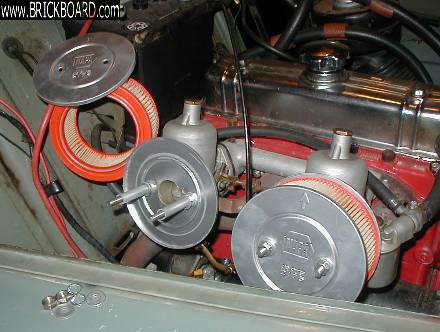|
|
|
Hey everyone,
I happened upon a fuel station somewhat close to home today that offers 100% gasoline (mid grade). I’ve never used it before, but I’ve heard about its supposed merits over 10% ethanol blend, especially for older engines. (Less corrosion to rubber and aluminum parts, increased power, etc) I’ve also read in a few places that beginning in 1980 many manufacturers began using rubber components that would tolerate ethanol when it eventually became available to the public, so if that’s true I suppose the corrosion argument isn’t really valid, at least for the rubber bits.
When I first acquired my ‘82 244 (B21F), I used the cheapest gas I could find (usually Walmart) until she developed a substantial knock when accelerating or going uphill. I upgraded to 91 octane and that seemed to get rid of most of the knocking, but I was still using off-brand fuel. In the process of restoring the car I have renewed the entire fuel system from tank to injectors with NOS parts (with the exception of the fuel distributor) and began using top tier fuel only (BP or Exxon). I have found that as long as I’m using top branded fuel, I can get away with 87 octane and she still runs great. Full accelerations, uphill, etc with not a single stumble. I’m sure part of the improvement came from having all new parts and lines too, but I’ve running this way for a year now with no complaints.
I’ve not seen any posts in the 200 series forums that describe anyone’s actual experience using the 100% fuel with these older motors, and if there are any noticeable differences upon using it. Small mpg/power boost, smoother running/idling, etc.? Thanks for any input!
|
|
-
-
|
|
|
Replacing the engine harness alone last year made a big difference. So did thoroughly cleaning all remaining connections, all new vac lines, new fuel tank, lines, filters, disassembly and cleaning of intake, throttle body, etc. to get rid of all carbon deposits. I'm getting about 250 miles per tank at 70 mph with a BW55 tranny, so I believe this KJet is running about as good as it ever will. Just curious about any noticeable differences using the straight fuel. It would really be interesting to do a "blind" test and see if the placebo effect takes hold.
I appreciate everyone's input on the subject!
|
|
-
|
|
|
Install some NGK spark plugs and Quality wires. I use STP gasoline treatment along with 87/octane. Boost without knocking under load. You can also adjust the distributor a few degrees.
|
|
-
|
|
|
Already have them :) Just wondered if there was any real benefit to using the ethanol free fuel. It's about the same price as regular midgrade around here.
|
|
-
|
|
|
If we filled it without telling you, you wouldn’t know the difference. Might see a 2-3% increase in fuel mileage. No noticeable power difference.
--
82 242-6.2L; '17 Mazda3; '16 Crosstrek
|
|
-
posted by
someone claiming to be drew
on
Thu Feb 8 17:28 CST 2018 [ RELATED]
|
|
This has been my experience with plain bone-stock B230F motors, in 1988, 1991, and 1993 240s. 100% gasoline is readily available here in 87, 91, and 93 flavors and it makes no perceptible difference in my experience.
|
|
-
|
|
|
Its called clear 88 around here. My experience with it is positive. If the station wasn't 5 miles from my usual routes I'd use it every time. My 83 245 feels completely different on it. My pedal has immediate response and the power is improved. Feels like a different car using the clear fuel.
Its also smart to use it in lawnmower/snowblowers to avoid problems with the carbs.
|
|
-

|
|
FWIW, here is a site that lists and maps out stations that sell 100% gasoline.
Unfortunately for me, though I can get 100% in CT, it's only 94 octane and above which is prohibitively expensive for my daily driver.
I remember using non-oxygenated fuel on a few trips to Canada in my '86 745 years ago.
I got about 3-4 more mpg. Didn't notice any improvement of performance though.
https://www.pure-gas.org/index.jsp?stateprov=CT
|
|
-
|
|
|
When my car was new (1980) what we had was 100% gasoline, and it ran fine. The current blends with varying amounts of ethanol do have some impact on performance and fuel economy, but are marginal, and only noticeable to those who really want to look for it, at least in my experience. The rubber parts on my car, as a matter of normal maintenance over the years have all been replaced at one time or another with newer pieces that tolerate ethanol, so no problems there.
As to your knocking problem, most likely NOT related to cheaper vs. "top tier" fuel, but more likely overall condition of your fuel system. On older cars, there are many small places tat are candidates for air leakage into the fuel intake system (injector seals, vacuum hoses, etc.). While each one can be small, in combination they can add up to the point of leaning out the actual intake mixture so that especially under load you can experience some knocking. A few years ago I had noticed some knocking at odd times on acceleration and at highway speeds under some load. Everything appeared to be fine as far as settings at idle were concerned -- O2 sensor voltage, idle speed etc. Then I went through and replaced all injector seals, vacuum hoses, snugged down clamps on hoses air intakes etc., and VOILA !, no more knock
|
|
-
posted by
someone claiming to be CB
on
Thu Jan 25 17:26 CST 2018 [ RELATED]
|
|
There has got to be some kind of prize for this post.
|
|
|
|
|




